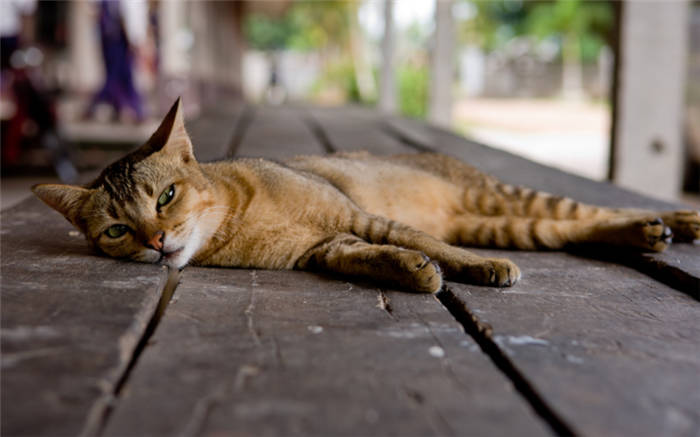Taurine has been added to cat food since the 1970s. Nowadays, all dry and wet cat foods contain taurine. It should be said that cheap economy class food does not contain taurine at the daily rate, so it is better to switch to other foods or buy vitamins.
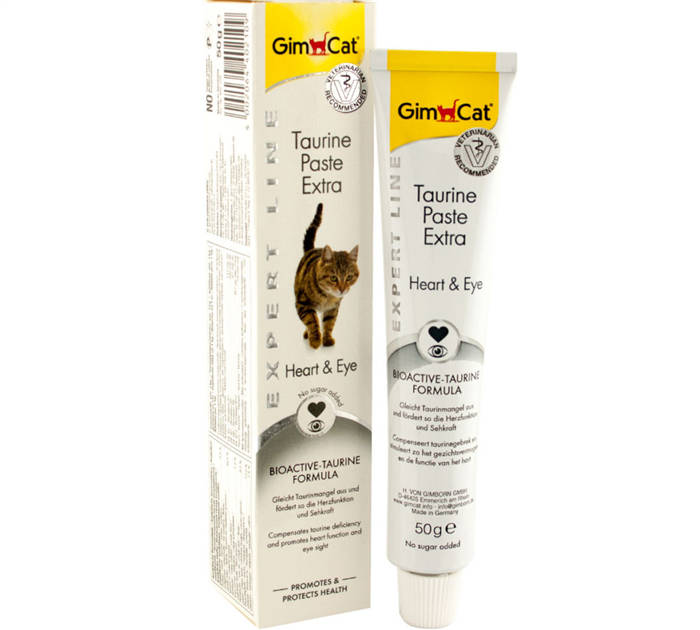
- Why taurine is needed
- Where do I get taurine for my cat?
- Why do cats need taurine?
- Where taurine is found
- What foods contain taurine
- What foods contain taurine for cats
- Dry and wet food containing taurine
- Natural foods containing taurine
- How to save sulfonic acid when cooking natural food for a cat?
- How to choose a cat food with taurine?
- Nutritional Supplements with Taurine
- Table: Dietary supplements with taurine, their composition and form of release
- Photo gallery: dietary supplements containing taurine
- Instructions for use
- Dry and wet food containing taurine
- Photo Gallery: Foods with Good Taurine Content
- What taurine is and why your cat needs it
- What happens to the cat's body in case of taurine deficiency
- Why taurine is added to cat food
- Do you have to add taurine to your food?
- Where taurine is found
- Taurine in natural food
- Taurine in prepared foods
- The best supplements with taurine
- Reviews from owners and veterinarians
Why taurine is needed
Taurine is formed from cysteine, which forms tissues and helps detoxify toxins.
- Strengthens the immune system – cats get sick less often when there is enough taurine;
- supports normal kidney and liver function – takes part in the formation of bile;
- keeps blood sugar levels at optimal levels;
- normalizes digestion – prevents bloating, constipation and diarrhea;
- improves hair condition – animals look well groomed and their hair is shiny;
- is responsible for good functioning of the heart, brain and nervous system, making the animal more enduring;
- is responsible for the formation and health of the eyes;
- helps a pregnant cat to bear healthy, viable offspring.
It's amazing how one element can affect the health of the body as a whole.
Where do I get taurine for my cat?
Quality food contains taurine in the right proportion: 1000 mg per 1 kg of dry food and 2000 mg per 1 kg of wet food.
In cheap economy class food the ratio of the daily norm of taurine is broken in a smaller way, and meat and by-products they contain only 4% (!).
So it's worth thinking 100 times before feeding your pet with these "pacifiers".
When feeding a natural diet, it is worth taking care of a feed supplement containing this important element.
Your veterinarian should be able to help you find the right mix based on your cat's individual circumstances.
Important ! Dog food does not contain the right amount of taurine for a cat, so a cat should not be fed canned food or dog food!
Why do cats need taurine?
First, let's understand how taurine affects cats. The substance is involved in almost all vital processes in the cat's body:
- Forms bile and its components, which contributes to better digestion of fats;
- Normalizes the work of the nervous system, brain, heart;
- Improves reproductive function, helps to have healthy offspring;
- Strengthens the immune system, prevents the risk of colds and infectious diseases;
- Stabilizes blood sugar levels, strengthens the walls of blood vessels;
- Promotes normal development of the retina;
- Helps improve digestion and reduces the risk of gastrointestinal diseases;
- Improves the condition of the coat, making it softer and silkier.
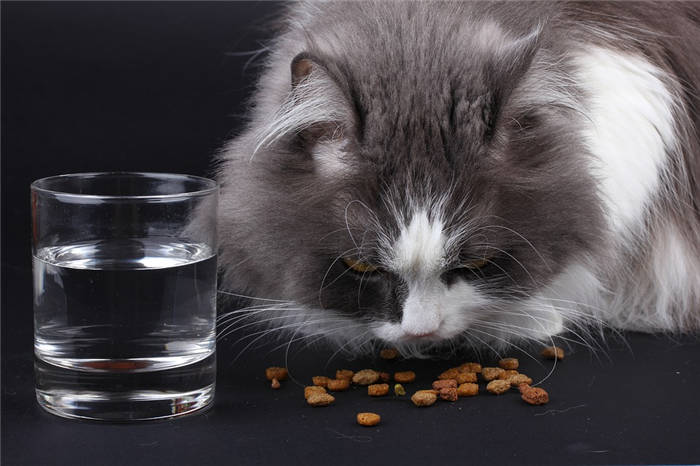
Where taurine is found
Cats that live in the wild get taurine from rodent meat. Just one mouse that is caught can provide an adult cat with enough taurine to last a day. Perhaps this is why nature has removed the ability to synthesize the amino acid on its own from the cat's body.
In wildlife, taurine is part of an animal's natural diet. However, domestic cats do not have the ability to catch mice, so breeders compensate for the lack of sulfur-containing acid from prepared foods and natural food.
What foods contain taurine
The sulfonic acid is found in large amounts in turkey, fish, seafood and by-products. The leader among seafood in terms of taurine content is considered to be tuna meat. Among meat ingredients, turkey meat, beef liver, and chicken hearts are the most valuable. Mussels, squid, and oysters can also be used as a source of the amino acid. Other seafood also contains taurine, but the amount is insignificant.
If the cat eats natural food, the daily ration should be calculated so that the pet gets all the necessary nutrients, including taurine. It should be remembered that the maximum sulfonic acid content is observed in raw food. Temperature treatment and even fine grinding make taurine disappear, and you will have to compensate for its deficiency with supplements.
What foods contain taurine for cats
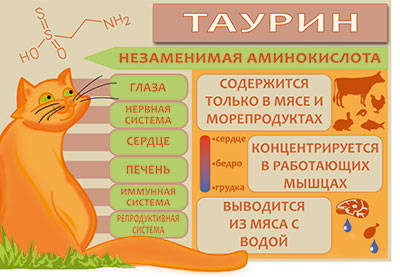
Taurine is a sulfonic acid that is found in animal tissues. Unlike other amino acids, it is not part of proteins and does not participate in their construction. Taurine is important for vision, heart, brain, kidney and liver function and for normal digestion. It participates in metabolism, activates the immune system, improves brain function, increases endurance and protein absorption, regulates hormones and accumulation of fat tissue.
The cat's body does not synthesize taurine, so it is an essential amino acid and must be supplied with food in sufficient quantities. Since this substance is involved in the formation of bile salts, its loss during digestion is high. Unlike other animals, cats rely exclusively on taurine to interact with bile acids, regardless of its level in the diet. A cat's sulfonic acid requirements are very high. Some researchers attribute this to the high fat content of the natural diet. Regina Eisert of the Smithsonian Environmental Research Center has hypothesized that this is due to brain size. The cat is a small mammal with a large brain that requires glucose to function. This sugar is synthesized by gluconeogenesis from amino acids. And the increased requirements for sulfur-containing amino acids, including taurine, are due to their high oxidation rate. Although there is no single explanation for a cat's dietary needs for sulfonic acids, the uniqueness of these needs has been experimentally proven.
Taurine deficiency has serious consequences, such as irreversible retinal degeneration, dilated cardiomyopathy, reproductive failure, fetal abnormalities and liver lipidosis. Unfortunately, the effects of the deficiency may not become noticeable until months or years later. But if symptoms appear, significant health damage has already been done, and most of the changes are irreversible. A complete lack of taurine in a cat's diet will very quickly lead to its death.
Dry and wet food containing taurine
Many owners do not know about taurine in cat food, what it is. In fact, it is an essential amino acid that helps repair tissue and renew cellular balance.
There are cat foods based on the amino acid. For example, Proplan with taurine. It contains a large dose of the substance, so it can completely replace the missing micronutrient.
Important! They contain an equal amount of the substance, so the dosage is selected individually for each pet after a visit to the doctor. If the breeder himself will use a food that the cat does not need, it will cause harm.
Natural foods containing taurine
If a cat is found to be taurine deficient, products containing a rich vitamin composition should be used:
FYI! More of the substance is found in raw foods. If they are subjected to heat treatment, much of the taurine will be destroyed.
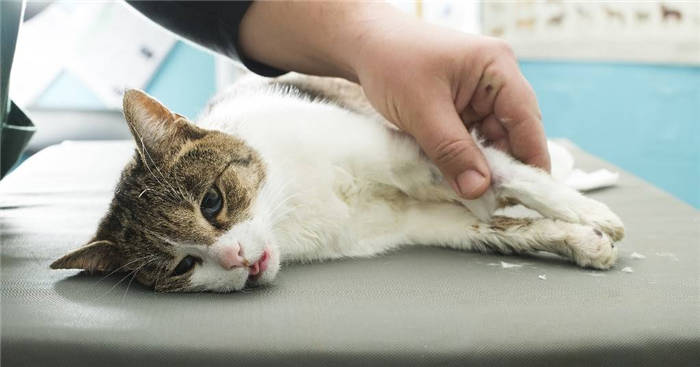
Taurine deficiency is a disease that leads to blindness, impaired musculoskeletal function, cardiovascular activity. Many owners who have healthy animals find out from their veterinarian what taurine is in cat food. Doctors recommend giving it to absolutely all animals, healthy and sick. But before using it, it is recommended to find out in what dosage it is allowed for the pet.
How to save sulfonic acid when cooking natural food for a cat?
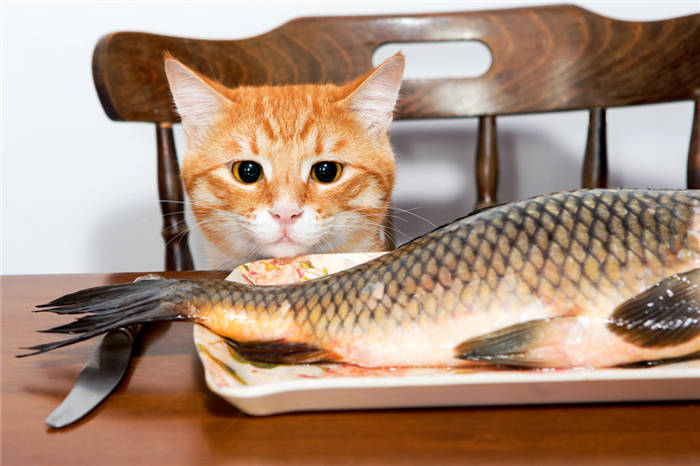
In the maximum concentration of this amino acid is contained in raw foods, but meat and fish can not always be given to the cat in unprocessed form. We are talking mostly about river fish, which can be infected with helminths. In this case it should be steamed or baked. Cooking "washes out" the taurine, so when using this type of processing, broth should be given to the pet as well. Fried food should not be given to animals a priori, as it has a negative effect on their health.
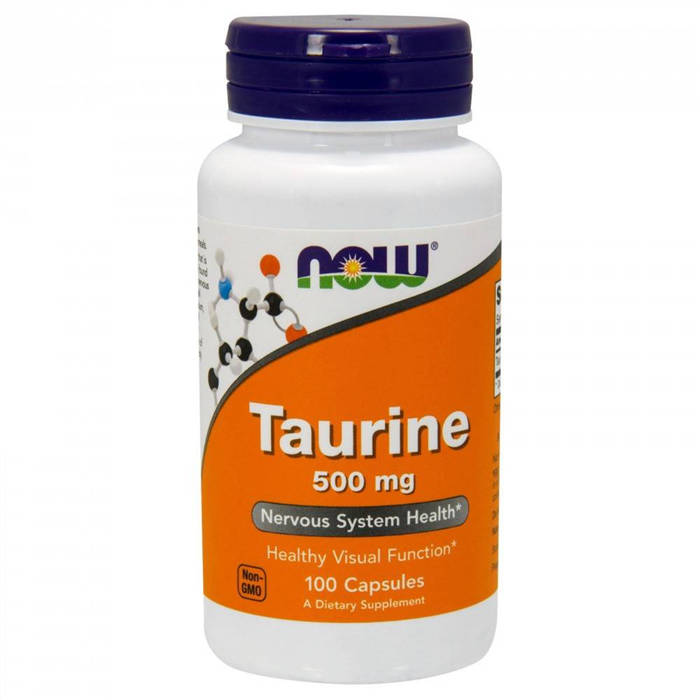
A lot of taurine is lost when defrosting foods, so you should buy chilled meat and live fish. The concentration of sulfonic acid also decreases when fillets are heavily chopped and placed under bast.
How to choose a cat food with taurine?
Taurine is found in all premium and super-premium cat foods. The recommended level of the amino acid in dry food is 1 g per kg of food, and 2 g per 1 kg in wet food. Among the expensive foods are such as "Acana", "Grandorf", "Applaws". Such foods have an ideal ratio of all components, which ensures full development of the cat.
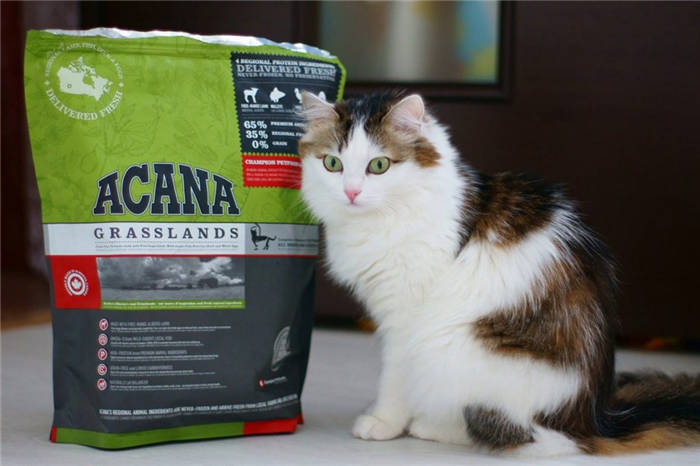
In the food economy category ("Kitikat", "Viskas", "Night Hunter") also has taurine, but they are not recommended to give animals because of the unbalanced composition and the inclusion of harmful ingredients. Feeding such foods can lead to serious health problems.
During pregnancy, a cat needs a doubled dose of sulfonic acid in order for the kittens to be born healthy. To this end, you should select special food for pregnant animals or include food supplements in your cat's diet, after consulting with your veterinarian in advance.
Nutritional Supplements with Taurine
Taurine supplements are an effective way to prevent and treat taurine deficiency. They may contain only taurine or other useful components.
Table: Dietary supplements with taurine, their composition and form of release
- taurine – 1150 mg;
- Vitamin A – 4400 IU;
- Vitamin D3 – 870 IU;
- Vitamin E – 430 mg;
- Vitamin B1 – 270 mg;
- Vitamin B2 – 540 mg
- Vitamin B12 – 2200 IU;
- biotin – 56000 IU
- taurine – 800 mg;
- biotin – 1280 mg
- taurine – 10 000 mg
- Vitamin D3 – 25000 IU;
- Vitamin E – 4000 mg;
- Vitamin B1 – 100 mg;
- Vitamin B2 – 80 mg;
- Biotin – 4000 mg
Photo gallery: dietary supplements containing taurine
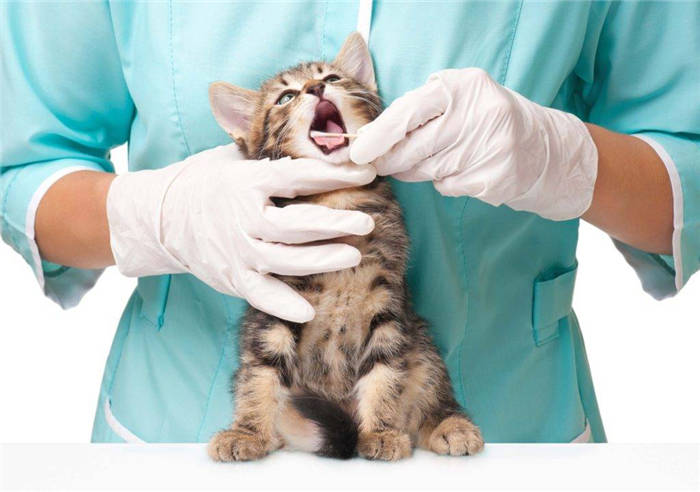 Dietary supplement Top 10 contains taurine, biotin and other beneficial substances
Dietary supplement Top 10 contains taurine, biotin and other beneficial substances 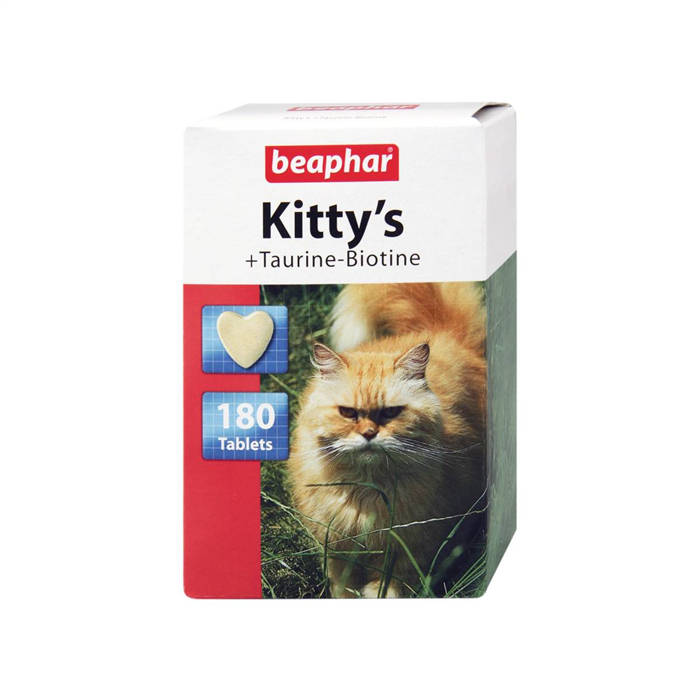 Dietary supplement Top 10 contains taurine, biotin and other beneficial substances
Dietary supplement Top 10 contains taurine, biotin and other beneficial substances Kittis product is enriched with taurine, vitamins A, E, D3, B vitamins
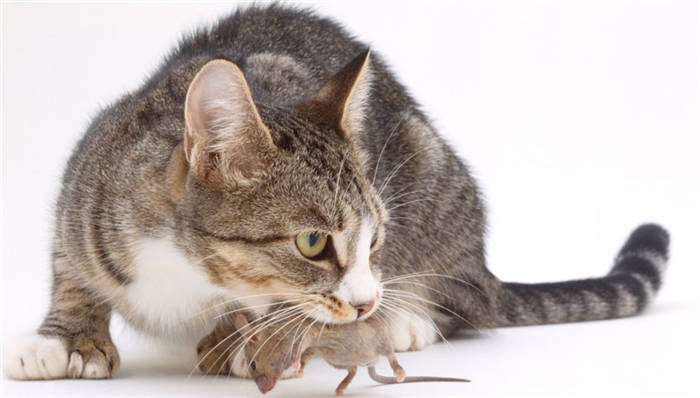 Petvital Vitamin Gel with taurine is designed for the treatment and prevention of taurine deficiency
Petvital Vitamin Gel with taurine is designed for the treatment and prevention of taurine deficiency 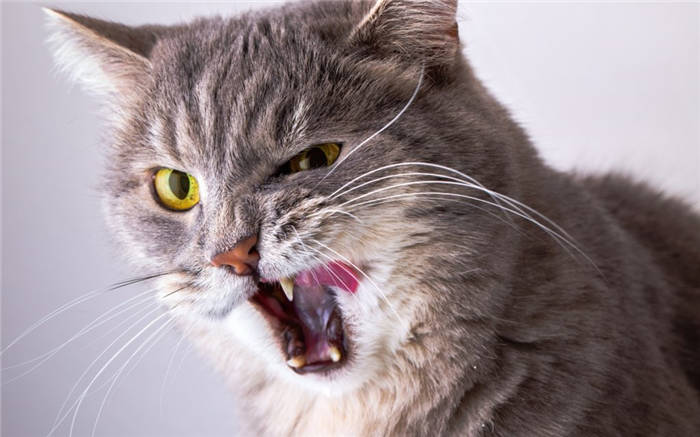 Petvital Vitamin Gel with taurine is designed for the treatment and prevention of taurine deficiency
Petvital Vitamin Gel with taurine is designed for the treatment and prevention of taurine deficiency Taurin is available in powder form for mixing with food
Instructions for use
Each dietary supplement should be accompanied by instructions containing information on the drug's administration regimen. However, a veterinarian should be consulted before using any medication.
Dry and wet food containing taurine
Cats that eat prepared foods rather than natural food are less prone to taurine deficiency. This is because most modern cat foods contain enough taurine. The best choices for cats are premium, super-premium, and holistic cat foods. It is in these products that the percentage of taurine is highest. Economy class products do not have this merit.
The first ready-to-eat cat foods appeared in the middle of the 20th century. Products did not include taurine, so many pets suffered from heart and eye disease. Since then, many medical studies have been conducted that confirmed the importance of taurine for cats. Since 1980, manufacturers began to include this beneficial substance in prepared foods.
The minimum taurine content of feed is 1000 mg per 1 kg of product. However, in order to correctly assess the taurine content of wet foods, one should look at the amount of taurine in the diet, not the dry matter. The dry and wet foods of the following manufacturers meet these requirements:
- Monge – in addition to taurine, the products are enriched with other beneficial vitamins and minerals as well as valuable polyunsaturated fatty acids;
- Brit – each of the foods additionally contains fish oil, probiotics, extracts of healthy fruits and herbs;
- Royal Canin – Foods also include folic acid, omega-3 and omega-6 fatty acids, and chicory.
Some irresponsible owners feed a cat food formulated for dogs. However, dog foods contain less taurine than cat foods. As a result, such food can cause a cat to develop taurine deficiency.
Photo Gallery: Foods with Good Taurine Content
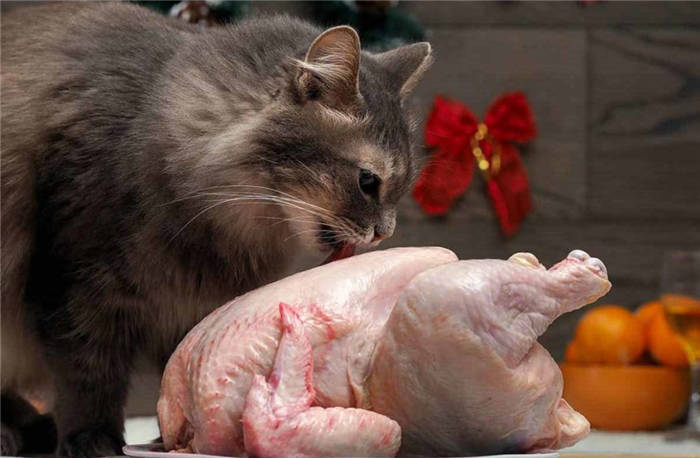 Monge dry food is packed with taurine, vitamins and minerals
Monge dry food is packed with taurine, vitamins and minerals 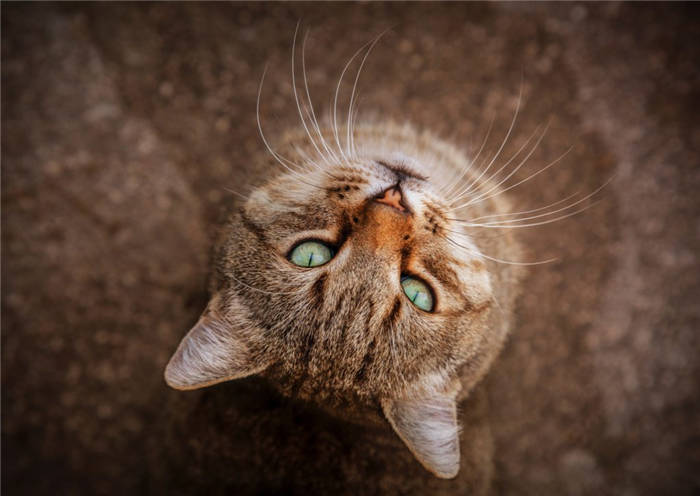 Monge dry food is packed with taurine, vitamins and minerals
Monge dry food is packed with taurine, vitamins and minerals Brit wet food, high taurine content, probiotics and fish oil
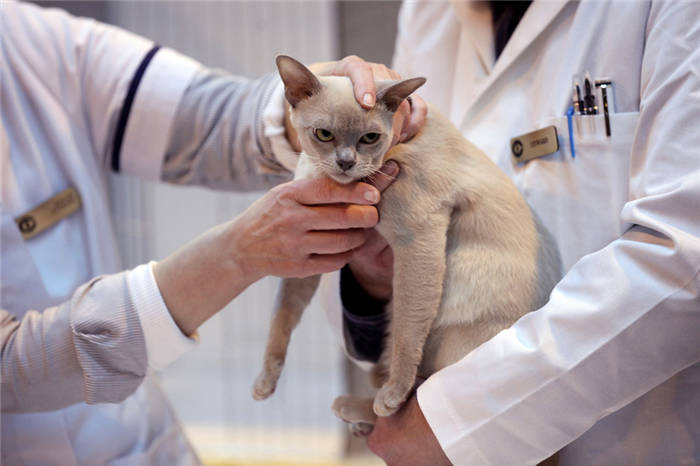 Dry food from Royal Canin, which provides plenty of taurine and other nutrients
Dry food from Royal Canin, which provides plenty of taurine and other nutrients
What taurine is and why your cat needs it
Taurine is an amino acid. The mammalian body produces it itself. It turns out that it is always in short supply in pets. Cats that hunt and eat rodents make up for their taurine deficiency naturally. Pets, on the other hand, need to be supplemented with taurine.
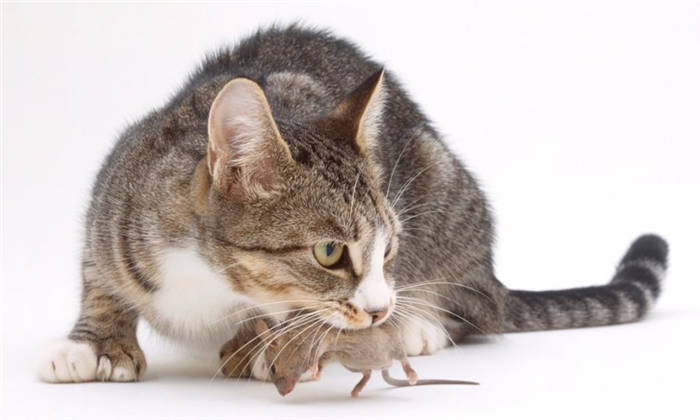
It was first heard of when German scientists obtained it from bovine bile. Taurine is created from cysteine, which forms tissues and other substances the body needs, and detoxifies toxins.
So why is taurine so essential to a cat? You can name a few of the most basic reasons to be convinced of the importance of taurine:
- It strengthens the body's defenses. Cats that do not get enough of this amino acid often get colds and stay sick longer.
- Improves liver and kidney function. Fats in the body are digested with the help of bile, in the formation of which taurine takes part.
- Sugar is normalized.. Diabetes mellitus is very scary for cats, its treatment is quite difficult and expensive. On top of that, complications are possible.
- The digestive organs work better. No bloating, good digestion and absorption of nutrients, stools uniform.
- Improved coat quality .. It becomes shiny, smooth, does not fly, gets a healthy appearance. The animal looks well-groomed and beautiful.
- Cardiovascular system, brain and nervous system work harmoniously.
- Healthy kittens are born. This amino acid is important in the development of the fetus, in the course of the gestation period of the cat.
Synopsis! Considering all of the above, it should be noted that this substance is vitally important. It is involved in many processes in the body.
What happens to the cat's body in case of taurine deficiency
Taurine deficiency is not immediately noticeable. If the animal is healthy, has a strong body, the lack of the amino acid at first does not manifest itself at all. If, however, the following symptoms begin to be observed, then it is necessary to take action:
- First the vision decreases. Observing the cat, you may notice that he began to bump into different objects, seemingly for no reason. Urgent treatment of the cat is required, as there is a risk of complete or partial blindness.
- Dilated cardiomyopathy develops .. The first step toward heart failure. Oxygen deprivation, irregular heart rhythm appears. The animal begins to eat less, move less, body temperature becomes lower. A condition noticed in time can be treated quickly.
- Problems with teeth. They collapse and fall out.
- Frequent respiratory illnesses. Constant coughing and colds of the respiratory tract should alert the owner.
- Blood clotting is disturbed..
- Disturbed growth of the animal.
- Increased nervousness and fearfulness of the cat.
- Complications of pregnancy and childbirth. Kittens may be born with birth defects or prematurely.
Even if taurine is insufficient in small amounts, the animal becomes lethargic, sedentary, and does not eat well. Some neglected diseases may already be incurable. Therefore, it is necessary to provide your pet with sufficient nutrition and care.
Warning. Breeders should monitor the content of taurine in the nutrition of producers' pets to ensure that the offspring are healthy.
Why taurine is added to cat food
I'm sure you've seen the ingredient taurine in cat food. In our cat foods, for example, we make sure to add it. Let's find out what this substance is and why it is useful.
In nature, cats eat almost all meat. It contains many proteins, which consist of amino acids. Each type of meat has a different set of amino acids – all of which are necessary for an active life and good health. These substances are involved in many processes, from building energy to keeping the heart working.
Taurine is one of the amino acids. It is found in muscles, heart, brain, eye fiber, and other organs. Taurine is involved in the cardiovascular system, supports vision, enhances reproductive health and immunity – these are just the basic functions of the amino acid, if it is deficient, the whole body suffers.
Do you have to add taurine to your food?
In humans, dogs and most animals, taurine is self-produced in the body. Its deficiency in this case is very rare, for example, with a poor diet. But then many other nutrients will be deficient as well. This is why humans and dogs are undesirable to consume additional taurine – there may be an excess in the body.
In cats, taurine is practically not produced in the body. If they do not get this amino acid with food, they suffer from its deficiency. As we wrote above, taurine is found in the retina. If it is deficient, the cat's vision may deteriorate, and in neglected cases total blindness is possible. Also low amounts of taurine in the body lead to heart disease, often – to dilated cardiomyopathy (DCMP).
In addition, deficiency of the amino acid reduces immunity, pets become lethargic, their kidneys and liver function is impaired, the quality of hair and skin deteriorates. It is especially important to monitor the consumption of taurine in pregnant cats, because the health of the offspring depends on it.
Since cats can only get taurine from their food, we add it additionally to our dry and wet food. The amino acid is found in meat, which is the basis of Karmy's diets. However, to avoid taurine deficiency, we have included it additionally in the form of a supplement. If you look there, you will find the amino acid near the end of the ingredient list. For meat-based foods, a small amount of taurine is sufficient. Cats hardly ever have an oversaturation of taurine. After all, their body does not accumulate amino acid, all the excess excretes with urine.
Where taurine is found
The amino acid taurine is found in the meat of mice, rats and other rodents, which is the basis of the diet for the feline family in the wild.
One medium-sized mouse provides 100 mg of taurine per day for an adult house cat. This is why, in the course of evolution, nature has eliminated the useless function of taurine production from the cat's body.
Taurine in natural food
Cats that do not have the ability to trap mice get the necessary substance from other meats.
The amino acid is greatest in red meats and fish and some by-products: chicken heart and liver, beef liver.
In addition, a sufficiently large amount of taurine is contained in fresh seafood: oysters, squid, mussels. All other products of animal origin contain taurine in small amounts.
Important!
The maximum amount of this essential amino acid is found in raw foods. Thermal processing of foods, freezing and subsequent defrosting, as well as fine grinding destroys taurine.
Taurine in prepared foods
Modern pet food manufacturers claim that taurine for cats is a vital element. All brands, premium and above, contain this important amino acid.
Economy class food does not always contain taurine. Look closely at the contents of the food on the package before you buy. This way you can be sure that your pet will receive the necessary substance.
If there is no taurine in the food or if you feed your cat natural food, add taurine supplements to the cat's diet.
Important!
Recommended amino acid content: dry food – 0,1% (1000 mg per 1 kg), wet food – 0,2% (2000 mg per 1 kg).
The best supplements with taurine
Veterinary drugstores and pet supply stores carry a wide selection of treats, vitamins, and feed supplements with this amino acid.
Reviews from owners and veterinarians
Timur: "Before I took a cat from the shelter, I read a lot about proper feeding and care of animals. The cat was found on the street severely starved. Then I learned what harm a taurine deficiency does to a cat's body. I planned to keep the cat at home in a city apartment, where there is little chance of catching a mouse for dinner. The veterinarian advised me to immediately buy a food class "holistic", which already has all the necessary vitamins and minerals. I chose the well-known brand Acana – the Canadian manufacturer adds taurine to all products. My kitty quickly got stronger, fatter, cheerful and active."
Regina: "We took the kitty by advertisement. The previous owners had moved and were adopting the animal. When we showed her to the vet, it turned out that the animal had vision problems. The vet suggested that the animal had been fed cheap food for a long time. To restore the health of the cat we were prescribed vitamins Beaphar Top 10 with taurine. We gave them daily in the dosage indicated in the instructions. After a course of vitamins, we picked up our beauty food of high quality.
Svetlana Valerievna, veterinarian: "Clients of our clinic often ask: "How to give taurine to cats? Do all animals need this amino acid?" The answer to this question depends on what kind of food owners give their pets. If the animal is fed naturally, vitaminized supplements with taurine should definitely be in the diet. If he is fed a high-end industrial feed (premium, super-premium, holistic), additional supplements are not necessary. Economy class feeds have one plus – low price. They do not meet the needs of the cat's body.

